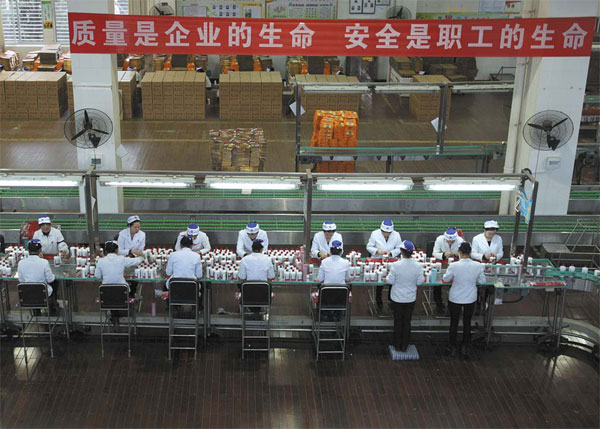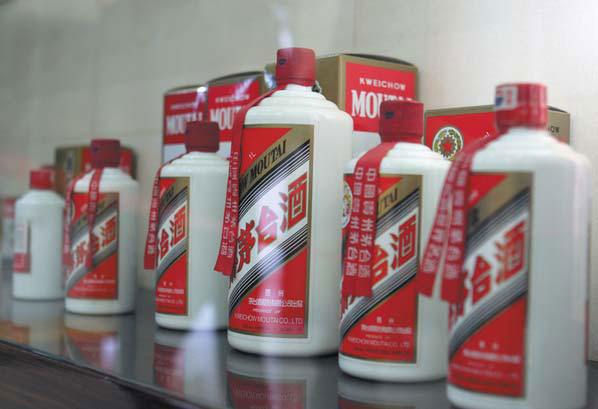Moutai distills experience into ambitious expansion
Luxury liquor brand bucks national spending trend
In the wake of China's crackdown on lavish spending, you would think luxury liquor maker Kweichow Moutai Co Ltd might be tightening its belt and anxiously eyeing up its future prospects.
However, a visit to the company's headquarters, distillery and production plant in Maotai town in Guizhou province tells a different story.
The town is filled with construction sites where huge buildings at various stages of completion stand next to the attractive Chishui River.
The building work is evidence of the liquor giant's self-assured plans to double the size of its facilities by 2020.
This is despite the government's anti-corruption campaign, which effectively bans the company's products from the tables of officials hosting dinner parties.
The baijiu - or white spirit - industry as a whole was hit hard by the crackdown. Moutai's main rival, Wuliangye, recorded revenue of 24 billion yuan ($3.82 billion) in 2013, a 9 percent drop from a year earlier.
Moutai, on the other hand, continued to grow, with more than 40 billion yuan in sales in 2013, an increase of nearly 13 percent from 2012.
The premium liquor maker experienced the least negative impact among industry peers.
The company has set out its vision for the future: "We consider rapid development and scientific development the main task.
"We are striving to consolidate and promote Moutai as the best distilled liquor in the world."
Confidence
When I visited Moutai there was no evidence of a slowdown or concern and the factory was in full swing, gearing up for what is its busiest time of year - the Spring Festival.
The 1,020 packagers worked at lightning speed putting the iconic red and white bottles into gift boxes.
Weng Zhihang, a 26-year-old graduate, has worked in the packaging department for three years and made her way up the ranks to group leader, overseeing 100 people.
When asked if she was concerned about her job security and the firm's prospects given the current climate she said: "Every business has ups and downs. I feel it a little bit, but I am confident of the company's future."
Other employees echoed Weng's sentiments.
Hu Jingshi started his career as a factory worker with Moutai in 1975 and is now in charge of the company's history books and archive.
"It's been a big change, from a workshop to a group. At the time when the factory was established there were 39 staff and now its 20,000.
"What hasn't changed is the spirit of the employees. The staff here still work hard and smart for the company," the 63-year-old said.
Zhao Yuanhang is in charge of buying Moutai's sorghum, which he said is grown in four main production bases in nearby counties by about 70,000 farmers.
"I believe this will fit the future requirements and demands," he said, when asked if the current 40,000 hectares of farmland would be enough for the planned expansion.
Zhao explained that in 2001 Moutai started a project that offers farmers support to grow sorghum and an indemnity policy against failed crops to ensure a healthy supply.
Tong Hu, a 56-year-old farmer, funded his three children through college after he changed from rice to sorghum farming in 2006 under the initiative.
Although he and his wife, Chen Derong, 55, still work from sunrise to sunset on their single hectare farm, Tong has come a long way from his childhood days when he said there often was not enough to eat.
"It was rough days because it wasn't as good as income. Life is better now," he said.
Tourism
Moutai also hopes to cash in on the allure of the brand by investing heavily to make the town a top tourism destination.
Ding Dagang, director of Guizhou's multi-tourism administration, said every year the town welcomes about 2 million visitors, the majority of which come from within the province for business and sightseeing.
The region's tourism revenue hit 44.7 million yuan in 2014, Ding said.
Proposals to boost these visitor numbers and put Moutai firmly on the tourist map include a new five-star hotel, tasting center, apartments and even a nearby airport.
A new "cultural plaza" will complement the existing 30,000-square-meter museum, which was recognized as the largest liquor culture museum in the world by Guinness World Records in 1999.
The museum has an entire section dedicated to the proposed developments and a scale model of the town and surrounding area gives a real sense of the huge amount of expansion planned.
Moutai's confidence is also backed by the Guizhou provincial government, which invested 23.5 million yuan in 64 tourism and infrastructure projects in the town in 2013.
Ten percent of the country's baijiu is produced in the area and 70 to 80 percent of Maotai town's 57,000-strong population is involved in the trade.
Almost every home has a distillery attached and the area is filled with several hundred baijiu workshops, which give off a pungent smell that hits you as you enter the town.
A stone's throw away from Moutai's compound is the "street of Baijiu" where independent liquor makers peddle their wares at a much lower cost.
Chen Chuanmei, 45, runs a small distillery and shop in the street with her husband and three children and said her customers were individuals and wholesalers.
"They come from all over China. They come for the reputation of Maotai town, to say they have the real liquor even if it doesn't come from the Moutai company," she said.
The industry is a major force behind Guizhou's economic growth and countless families depend on it for their livelihoods.
Zhang Jiebo, deputy Party chief of Maotai, admitted the town's GDP is slowing, with previous 17 percent growth falling to a projected 11 percent this year.
He said there were no plans to diversify beyond supporting the liquor industry and its related tourism business but that investment in environmental protection would ensure the sustainability of the linked trades.
Time will tell if Moutai's expansion plans, coupled with its marketing efforts online and overseas, will help the renowned brand not just survive but thrive following the present market slowdown.
If the confident approach pays off it could be a lesson for luxury brands in China.
|
A slogan in one of Moutai's factories reads, "Quality is the lifeline of Moutai and safety is the lifeline of its employees." Wang Zhuangfei / For China Daily |
|
The iconic red-and-white bottled Moutai is regarded as China's national liquor and represents the highest level in the industry. Wang Zhuangfei / for China Daily |
(China Daily 03/06/2015 page7)
















